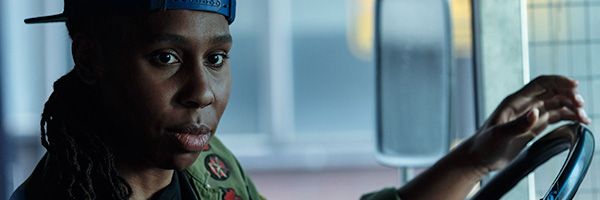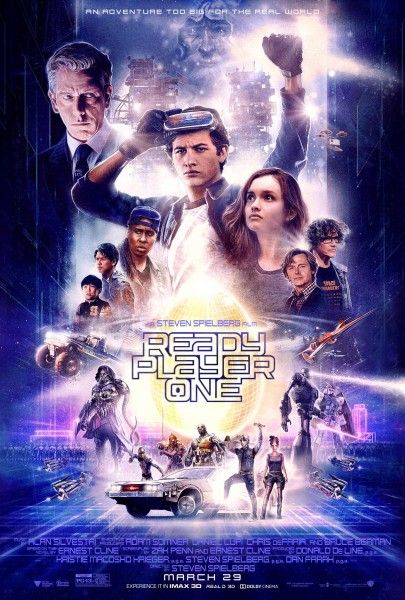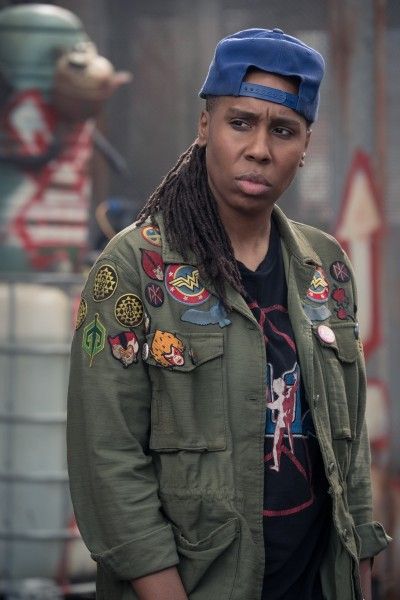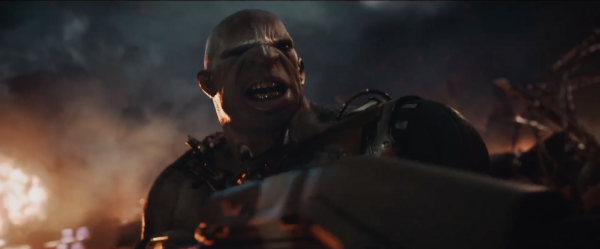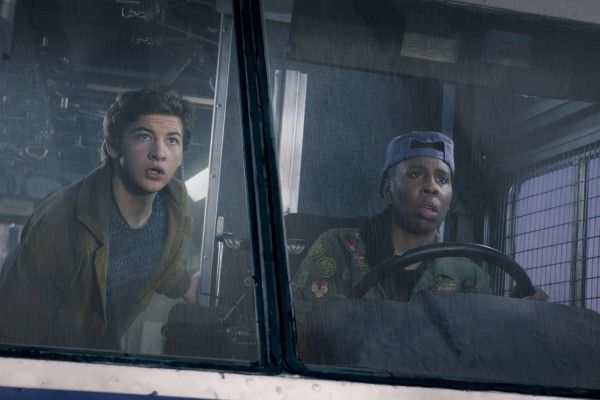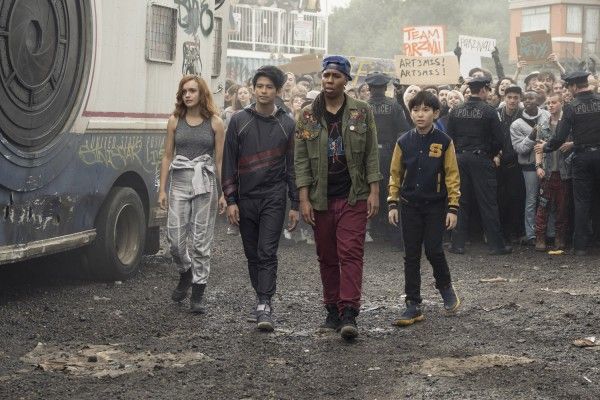From filmmaker Steven Spielberg and adapted from the book by Ernest Cline, the sci-fi action adventure epic Ready Player One is set in the year 2045 and follows Wade Watts (Tye Sheridan), as he escapes real life inside of the OASIS, an immersive virtual universe where most of humanity spends their days, living as any avatar they so choose and with only your own imagination as a limitation. When the OASIS was created by the brilliant and eccentric James Halliday (Mark Rylance), he embedded a three-part contest into it to find a worthy heir for his immense fortune and total control of this virtual world, and as Wade and his friends, called the High Five, take on the challenge, they put themselves directly into the path of danger.
At the film’s Los Angeles press day, Collider got the opportunity to sit down with writer/producer/actor Lena Waithe (who plays High Five member Aech, aka Helen) to chat 1-on-1 about finding herself with an unexpected acting career and how that’s influenced her when she’s wearing her other hats, the incredible experience she had on Ready Player One, what she’d would want her own avatar to be, what it was like to work and collaborate with Steven Spielberg, and the most fun sequence she got to do in the film. She also talked about what she’s most proud of with Season 1 of her Showtime series The Chi and what she’s most looking forward to with Season 2, her TBS pilot Twenties, and why she’s put out the word that she’ll read scripts from The Black List (that have an evaluation of 8 or above).
Collider: This was so much fun to watch! I can’t imagine how much fun it was to be in it.
LENA WAITHE: Oh, my God, it was phenomenal! It was amazing!
You’ve been turning in some really great acting performances.
WAITHE: Oh, thank you!
Could you ever have imagined that, while you were trying establish a writing career, that you would find yourself here, with an acting career?
WAITHE: No, no, not at all. I think that’s what’s so cool about it. It was not a part of my master plan, at all. I wish it had been. I wish I could say that I had this great idea like, “Yeah, I’ll do the acting thing, which will then help the writing thing.” It just happened, around the same time. With The Chi, Showtime said, “Hey, we want to make this pilot.” And then, like a month later, I got cast in Master of None and had to call them and say, “Hey, do you mind if I go to New York for a couple of months?” They were really great and gracious and said, “Sure, we’ll put the brakes on it. Call us when you’re back.” Then, when I got this opportunity, The Chi hadn’t been picked up yet, but I was writing and doing rewrites on things. I got cast in this and David Nevins, who’s the CEO of Showtime, was really cool and said, “Okay, go away and do that, but can you write remotely?,” and I was like, “Sure.” So, it all happened while I was still getting the writing stuff done. Ultimately, I had to write the “Thanksgiving” episode while I was filming Ready Player One. And Aziz [Ansari] came to London and had three days off, so we spent those three days writing the script. So, it all happened simultaneously, and then things just came out, as they did.
For me, it’s been a wonderful journey to just stand at different places on set, as an actor and understanding that role. I feel like I’m the least stressed, when I’m acting on a set, because I just gotta hit my mark and have fun with the lines, listen to the director, and go home. When I’m a writer on set, I’m not stressed, but my brain doesn’t shut off because I’m like, “I could improve that line” or “I could punch that joke up more” or “This scene isn't working the way I had intended it.” My brain is just constantly going, and I actually have fun doing that because I’m a writer first. When I’m a producer, that’s when I’m the most stressed on set because I’m thinking about everyone. I’m like, “Does the A.D. have what they need? Are these actors happy with their trailers? Is the catering up to par? Is the writer unhappy? Is the director making their day?” I just love being able to shape-shift and do all of those things. I think it makes me a pretty well-rounded performer. I think it makes me a sympathetic actor. If the crew is running late, or I’m coming behind, or the script supervisor isn’t there, I’m a little bit more sensitive to that versus someone who has only been an actor. I think there’s an element where they tend to maybe have an attitude about this or that thing. No shade to my actor friends, but I think because they haven’t done the job of a producer, or they haven’t written a script, they don’t always understand what goes on with that.
As an actor, my goal is to be the least worrisome. They have a lot of things going on, so when their stuff is starting, I’m like, “I’m good. I don’t need anything. Let me know when you’re ready for me.” I think there’ an element of that that directors, producers and people really appreciate because they’re just not used to it. And as a writer, it gives me a real sense of how I want to do things and what kind of producer I want to be. It’s great. I think everybody should do everybody’s job, for at least a day. Then, you’ll go, “Ah, okay! Got it!” Everybody thinks they’re the most important person on the set, to be honest. The truth is that everyone is equally important. I know that’s a Pollyanna way of looking at it, but having done multiple jobs on the set, it’s true. It really is.
We get to see what your character creates for an avatar, but if you had the opportunity to create any avatar for yourself that you wanted, what would it look like?
WAITHE: I would want my avatar to be either Prince or Tupac.
Nice!
WAITHE: Those are two guys that I love and am obsessed with.
When you’re on the set with Steven Spielberg, as someone who is a storyteller, was there anything you learned from how he does it that you feel you could take with you?
WAITHE: Well, he does it in a very unique way. It’s very specific and organized, but yet, he still leaves room for play. I know that’s a bit of an oxymoron, but it’s really true. He knows exactly what he wants, but he’s never afraid to allow the performers to move around and to try things a different way, if it feels more comfortable for us. That’s a great thing. He’s a really great collaborator. Even though he is the master of what he’s doing and you trust him completely, he’s never afraid to let you try something new and to play, and to go big or really small. That’s what’s so great about him. You always feel like you’re being guided in the right direction, but at the same time, you feel like you could try anything.
It’s so cool to hear that he still has such a love for it.
WAITHE: He does! He really does!
That could have easily could've faded away long ago
WAITHE: Long ago. He’s all right. He’s good, financially. But, he’s the most excited person on the set. He’s the first guy there, and he’s revved up and ready to go. That energy is so contagious that we all felt it. You always want to do a good job because it’s him, but you also want to do a good job because you like him, as a person.
It seems like you get to do a lot of crazy and wild things for this movie. Was there a most fun or crazy day on set?
WAITHE: For me, it was The Shining stuff. It was so nutty, and I got to play and roll around. There was cool stuff they did that was practical. You see Aech, but it’s me and my body. I create the things they simulate for what you’re seeing on the screen. So, at one point, I was on a rolling chair, and they were spinning me around and pushing me around. And then, I was pretending to see an axe come through a wall, but that axe is not there. I just got to be so silly and goofy and goof around, and I’m really happy it plays. It all worked out.
It sounds like you’re more familiar with The Shining than Aech was.
WAITHE: I hadn’t seen it. I watched it with Tye [Sheridan]. I’d seen bits and pieces, but I’d never sat down to watch that movie, so that was one of my homework assignments. Tye and I had to sit down and do that. It was not a bad homework assignment. It was cool!
Now that you’ve wrapped the season of The Chi, what are you most proud of having accomplished for the first season, and what are you most excited about, in getting another season?
WAITHE: Oh, man, there’s so much I’m excited about, in getting another season. I feel like we had a lot of things that I wanted to do, that I wasn’t able to really throw my weight around to get done. It doesn’t hurt, winning an Emmy. It doesn’t hurt with the network and studio being very kind and open to whatever ideas I have for Season 2, which is fantastic. The biggest idea I had was getting a new showrunner, which was imperative. Her name is Ayanna Floyd Davis, and she’s phenomenal. She’s an amazing black woman. She’s gonna be our fearless leader, and the leader that we need, honestly, for the show. So, I’m really excited about that. With Season 1, I was just super happy that people responded to my initial vision, which was to show how interconnected the lives of black people, particularly in the South Side of Chicago, and how human everyone can be and feel. There’s no good guys and bad guys. Everybody is flawed, in a beautiful way. The fact that people were connected to that was really amazing, and the fact that rating went up every week was always mind-boggling. You never know. It’s a premium cable show, and it’s very specific. The fact that people are talking about it, I’m deeply grateful. And the biggest thing was that Chicago is really approving of it, which really means a lot to me. It really means a lot to me that it’s been well received.
It’s such a human and real show.
WAITHE: Thank you so much. I really wanted to humanize these characters and make them relatable, but not in a way that cheapens the story, in any way. People can see themselves in these characters because we’re all doing the same stuff.
You’ve also had Twenties picked up by TBS.
WAITHE: Well, we have the pilot order, which was fantastic. I keep telling people that it’s the pilot order because we still need good vibes and prayers, and all that good stuff, for the series order. Justin Simien is going to be directing the pilot, which is extremely exciting. He’s so dope. This will be our first time working together since Dear White People, so we’re super excited. He’s the perfect person to direct this pilot ‘cause he knows me very well, and he did the pilot presentation all those years ago. We’re excited. Our plan is to just give them a phenomenal pilot, so much that they’ll say, “Okay, we’re gonna give you guys a series.” So, good thoughts and good vibes, only.
What made you want to tell that character’s story?
WAITHE: Well, I wrote it back in 2009. I wanted to tell a story about a lesbian girl with two straight black friends, which is not unlike my story, just pursuing a dream. I think it took the world awhile to catch up to that, and I think that the “Thanksgiving” episode didn’t hurt. People really responded to that character and that story, and they were calling for a spin-off of Denise, her mom, her grandmother, and her aunt. Even though TBS was already onboard and we were already working – we just hadn’t announced it yet – I think it gave them the extra push that they needed to go, “Okay, America is ready for this show.” And why not? I’m just happy to dive in. I’m excited!
It was really cool to hear that you and your team are going to read scripts off The Black List.
WAITHE: Yeah, got to get an overall eight or above, which is not easy to get.
What made you want to and decide to do that?
WAITHE: Just because I think a lot of people out there need an opportunity, or they need the access. Some people feel like they have the material and they’re sitting on gold. For a lot of people, we’re gonna burst some bubbles, and we’re also gonna boost some egos. There’s some people out there who think, “I don’t think my shit is that great.” They pay for an evaluation, they get an 8, and they go, “Oh, maybe I do have something.” Or another person is like, “I’m Shakespeare and nobody knows it yet,” and they get a 5, and they’re like, “What the fuck?!” They can do one of two things. They could say, “This site is bullshit. They don’t know what they’re talking about. I’m gonna keep sitting here, thinking I’m great. I will never make it ‘cause I don’t have access.” But I hope that person goes, “Oh, I’m not as good of a writer as I thought. How can I be better?”
My next thing will be to introduce links for people that don’t live in Los Angeles or New York, for online classes for television, as well as feature. If they do live in L.A., I have a great relationship with a class called Script Anatomy, that’s taught by actual working television writers, on how to write a pilot, how to do a rewrite, and all these different things. Also, we have a couple of people that we’re cool with, who do feature writing classes. It’s not the UCLA writing program, where it’s thousands of dollars and not affordable. We’re just trying to create scholarships and give ways for people to understand the craft and how to do it. Some people who want to do it, don’t know how. Some people are really good at it, but they don’t have the access.
So, what The Black List site does for me is that it helps me put people in different camps. It’s like, “Okay, you want so desperately to be writer, but you don’t know how to do it? Okay, great, here are some links for you. If you live in L.A., here are some classes. If you can’t afford it, let us know. We’ll try to figure out how we can help you. If you get an 8 or above, that means you’ve got a pretty good skill-set and you know what you’re doing. So then, give us your evaluation, so we can read the synopsis and we can tell if, “Hey, this sounds like something I want to produce” or “Hey, this sounds like something someone I know would want to produce.” We’ll send them the evaluation and they can look at it and say, “Yeah, we’d like to read it,” and they can read it and have a meeting, and you’re off to the races. It ain’t that hard, but very few people really take the time to do it. That’s the way you change Hollywood, from the inside out.
Are you looking to keep doing the acting thing?
WAITHE: Oh, yeah, it just has to be really special ‘cause we’ve got a lot going on. Movies, no matter how big or small the role is, take a couple of months. If you take me away from all this stuff, it better be a good reason. Spielberg was a good reason, and this character was phenomenal. It was a once in a lifetime opportunity, and I’m glad I got to do it.
Ready Player One is now playing in theaters.

